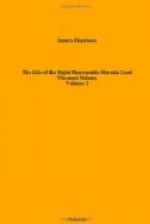with suitable pictures and statues of naval heroes
and their glorious atchievements, in which Lord Nelson
and his transcendent actions must for ever stand pre-eminently
conspicuous, would far surpass, in genuine grandeur,
perhaps, and certainly in rational and philosophical
contemplation, the loftiest and most stupendous pillar
or pyramid ever raised by human art and industry, for
little other purpose than to attract the gaze of profitless
admiration, with the vain attempt of mocking the powers
of tempests and of time, by which the proudest of
these trophied monuments must necessarily be bowed
to subjection, and finally crumbled into dust.
The solitary hermitage, which shelters a single hoary
head, is more interesting to the feeling heart than
the proudest display of barren pomp that neither rises
over the tomb of departed worth nor affords any living
mortal a comfortable habitation. The grand naval
pillar, to commemorate the battle off the Nile, for
which a large sum was some years since subscribed,
without any previously decided plan, and which is
said to be still undisposed of, if employed in erecting
a respectable edifice for the residence of those brave
veterans by whom that battle was fought, and such of
their successors, for ever, as should live to find
such a residence desirable, might be so constructed
and endowed, with the money contributed, as to afford
a higher satisfaction to the subscribers; a superior,
and perpetually renewable, memorial of the event;
and a far more gratifying object of contemplation,
even for such of the brave heroes who may never need
such a sanctuary; than the loftiest and most embellished
obelisk that human ingenuity can ever devise, or human
industry execute. This is a subject on which
the author could with pleasure dilate; and the promotion
of which he would gladly assist, in every way, with
all his slender abilities: but, at present, it
is an agreeable reverie, in which he feels that he
must no longer indulge.
He will, however, transcribe one of Lord Nelson’s letters written on the subject which led to this digression, as a satisfactory proof of his lordship’s attention to the mercantile interests of his country in that respect, and at this particular period.
“Palermo, 25th Feb. 1799.
“GENTLEMEN,
“I have received your letter of the 23d. I can assure you, I have always the greatest pleasure in paying attention to the representations of the masters of merchant ships; who, at this distance, act for their owners in Great Britain. I can have no difficulty in granting you a convoy to Leghorn; but it is my duty to again point out to you the expressions of Mr. Windham’s several letters, and the request of the English factory at Leghorn to Captain Louis: and, at the same time, you must be sensible that an English man of war cannot always lay in the neutral port; and I expect, that the Minotaur is now on her passage to join me. If, under all these circumstances, you still




